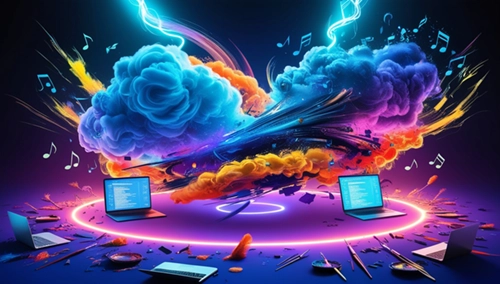The other day, while presenting my program: The AI Revolution – an audience member asked if AI wasn’t effectively going to dumb down our society since it will do the thinking for us. I suggested quite the opposite. Then this past week I saw this article and thought it might be worthwhile to review this in my AI series. The NPR article sheds light on a fascinating development: AI chatbots are now being recognized for their potential to boost creativity and learning. This revelation prompts a deeper exploration into how AI can be harnessed to foster innovation and educational growth.
Unpacking the NPR Article
The NPR article, titled “Research Shows AI Can Boost Creativity for Some, but at a Cost“, delves into the role of AI chatbots in assisting writers. According to the piece, AI tools are not merely automated responders but can actively engage with users to spark creative ideas and refine writing processes. The study mentioned in the article highlights how AI chatbots can generate prompts, offer stylistic suggestions, and even help overcome writer’s block. This is particularly beneficial for writers who often face creative slumps, providing a technological muse to inspire and enhance their work.
Supporting Evidence from Additional Sources
Several studies and expert opinions corroborate the findings presented by NPR, suggesting that AI’s role in boosting creativity and learning is far-reaching and impactful.
1. AI in Education: A report by *EdTech Magazine* emphasizes the transformative power of AI in the classroom. AI-driven tools can personalize learning experiences, adapt to individual student needs, and provide real-time feedback. These capabilities not only enhance learning efficiency but also encourage creative problem-solving by offering diverse perspectives and approaches to a single problem.
2. Creativity Enhancement: Research published in the *Journal of Creative Behavior* outlines how AI tools can augment creative tasks. The study found that AI can act as a collaborative partner, offering novel ideas and approaches that human collaborators might not consider. This partnership between human creativity and AI’s vast computational power leads to innovative outcomes that are both unique and valuable.
3. Overcoming Cognitive Biases: An article from *Harvard Business Review* discusses how AI can help overcome cognitive biases that often limit human creativity. By presenting unbiased suggestions and diverse viewpoints, AI systems can break the mold of conventional thinking, leading to more original and inventive solutions.
Real-World Applications
The practical applications of AI in enhancing creativity and learning are already visible in various sectors:
– Writing and Journalism: Tools like Grammarly and Jasper (formerly Jarvis) use AI to assist writers by providing grammatical corrections, style improvements, and content suggestions. These tools are invaluable for both novice and experienced writers looking to polish their work.
– Education: Platforms like DreamBox and Knewton leverage AI to create adaptive learning environments. These platforms analyze student performance in real-time and adjust the curriculum to suit their learning pace and style, making education more personalized and effective.
– Art and Design: AI applications such as DeepArt and Runway ML enable artists to experiment with different styles and techniques, pushing the boundaries of traditional art forms. These tools provide artists with new mediums and methods to express their creativity.
Ethical Considerations
While the benefits of AI in enhancing creativity and learning are significant, it is crucial to consider the ethical implications. Transparency in AI algorithms, addressing biases in AI-generated content, and ensuring the human element remains central to creative processes are essential considerations. As we integrate AI into creative and educational spheres, maintaining a balance between technological assistance and human ingenuity is vital.
Conclusion
The NPR article on AI chatbots and creativity marks a pivotal moment in understanding AI’s potential beyond traditional applications. By enhancing creativity and learning, AI tools can unlock new avenues for innovation and education. As we continue to explore and refine these technologies, the collaboration between AI and human creativity promises to yield unprecedented advancements in various fields.
Sources
– [NPR Article on AI Chatbots and Creativity](https://www.npr.org/2024/07/12/nx-s1-5033988/research-ai-chatbots-creativity-writing)
– [EdTech Magazine on AI in Education](https://edtechmagazine.com)
– [Journal of Creative Behavior Study on AI and Creativity](https://onlinelibrary.wiley.com/journal/21626057)
– [Harvard Business Review on AI and Cognitive Biases](https://hbr.org)







